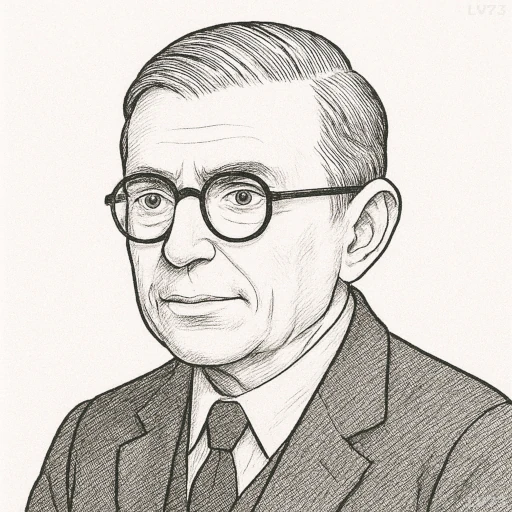“I do not believe in God; his existence has been disproved by Science. But in the concentration camp, I learned to believe in men.”

- June 21, 1905 – April 15, 1980
- Born in France
- Philosopher, novelist, playwright
table of contents
Quote
“I do not believe in God; his existence has been disproved by Science. But in the concentration camp, I learned to believe in men.”
Explanation
In this powerful statement, Sartre reflects on the absence of divine meaning and the human capacity for survival and solidarity in extreme conditions. Sartre begins by rejecting the idea of God, aligning with his atheistic existentialism, which holds that the universe is without inherent meaning or a higher power that can provide purpose. He references Science as a tool that, in his view, has disproven the existence of a higher divine being. However, despite his rejection of God, Sartre reveals a profound shift in his perspective during his experiences in the concentration camp—a place of unspeakable suffering and dehumanization.
The key turning point in this quote is Sartre’s discovery of human solidarity in the most dire of circumstances. Despite the brutal conditions, he came to believe in men—not in any supernatural force or divine power, but in the strength and resilience of human beings. Sartre suggests that in the face of extreme suffering, humanity has the potential to act with compassion, bravery, and a will to survive together. This shift represents his belief that humans, even without the guiding force of God, can create meaning through their relationships and actions toward one another. In this way, human solidarity becomes the bedrock of meaning in a world that might otherwise seem devoid of purpose.
In modern terms, this quote speaks to the power of human connection and resilience in times of crisis. It challenges the notion that divinity or external forces are necessary for moral strength or hope. In a world still grappling with war, injustice, and displacement, Sartre’s insight invites reflection on how individuals, communities, and societies find meaning and purpose in one another, rather than through divine intervention. Whether in times of personal hardship or collective struggle, the ability to rely on fellow human beings—through acts of kindness, courage, and mutual support—offers a powerful reminder of humanity’s capacity for goodness, even in the most harrowing of circumstances.
Would you like to share your impressions or related stories about this quote in the comments section?

